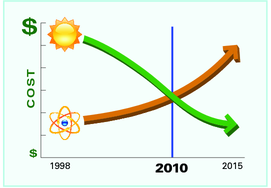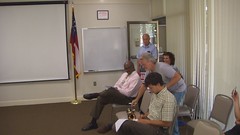According to Larry Elliott in the Guardian, 3 October 2010, 10,000 Birmingham council homes to get solar panels: City agrees £100m scheme, partly funded by banks and energy suppliers, to meet target for cutting carbon emissions
Energy efficiency and solar power to create jobs!Plans to fit power generating solar panels to council-owned properties in Birmingham will be pushed forward this week after the council agreed a “green new deal” scheme covering 10,000 homes.
In the biggest proposal for retrofitting houses through an energy efficiency upgrade yet seen in the UK, the council agreed a £100m proposal last week designed to create jobs and meet the city’s ambitious targets for reducing carbon emissions.
The plan – Birmingham Energy Savers – will be jointly funded by Birmingham council and investment from energy suppliers and commercial banks, and follows two successful pilot schemes conducted in Europe’s biggest local authority.
We have local proof of concept right next door Continue reading











